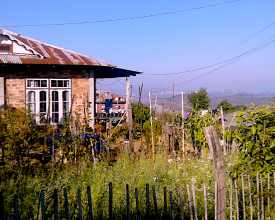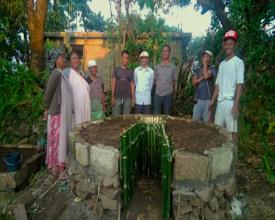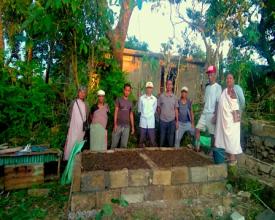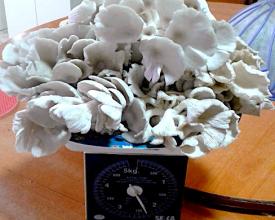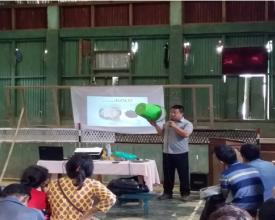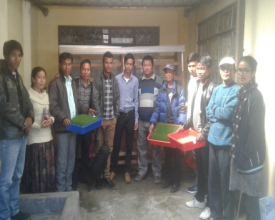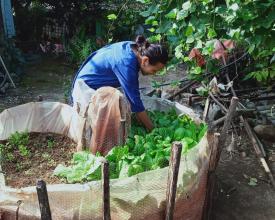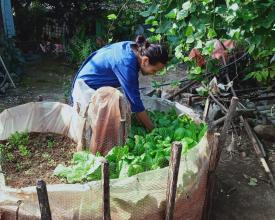
Home Garden
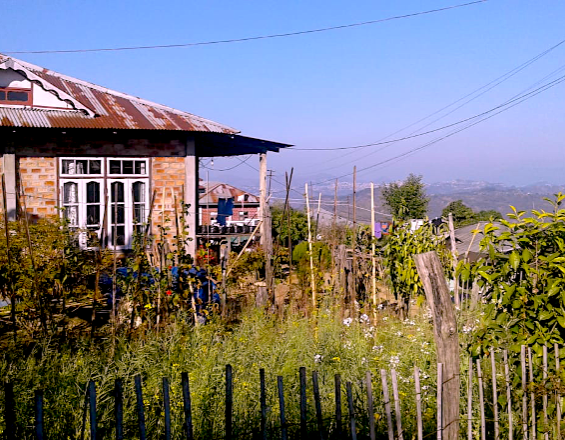
-
Home gardens are usually small plots of arable land near households. These plots are typically adjacent to the home to ensure easy mobility and convenience for women. A variety of herbs and vegetables are most commonly grown in these gardens for household use, and the surplus is often sold for additional income.
-
Such gardens host a variety of crops ranging from vegetables and spices which will provide food security, nutritional diversity, and help become self-reliant.
-
The aim of the Deutsche Gesellschaft für Internationale Zusammenarbeit (GIZ) GmbH and Bethany Society's project IKI Biodiv as an implementing partner is to develop and enhance the community 's ability to adapt the various techniques common to home gardens. Efforts were made to encourage the cultivation of a wide variety of indigenous vegetables and spices to foster rich biodiversity which provided a clear understanding of the strong relations between sustainable agriculture and biodiversity conservation.
Contexto
Défis à relever
-
Erratic rainfall: The success of the garden depends solely on the rainfall that has shown to be highly erratic in recent years. Irrigation is not present due to the high altitude and steep gradient of villages.
-
Loss of biodiversity: Agrobiodiversity has been declining in recent years due to the concentration of on-demand cash crops in nearby markets. Some indigenous crops are replaced by feared cash crops, resulting in a lack of awareness about how to grow such crops.
-
Poverty: Most households have low income, and employment is limited to agriculture, as there are no industries in the villages' vicinity. Farming is often subsistence, so surplus yields are scarce.
-
Nutritional diet: The lack of a variety of nutritional vegetables often leads to low nutritional intake in most households.
-
Adverse topography: Most villages are situated on hillsides making farming difficult. Preventing soil erosion thus becomes a constant challenge.
Ubicación
Procesar
Summary of the process
-
The series of awareness campaigns and exposure provided an excellent platform to address the knowledge gaps of the farmers and simultaneously created a demand to learn more about the connection between maintaining a rich crop diversity as a means to enhance their farming practice.
-
The subsequent building blocks which relate more to learning by seeing-and-doing and the many interaction with fellow farmers provided the necessary confidence for farmers to establish the required demonstration plots
-
The crucial building block of actual establishing the demonstration plots provided the practical skill and knowledge of engaging themselves in new farming practices
-
Constant supervision through follow-ups and handholding efforts from the implementing partner encouraged farmers to be actively involved.
Building Blocks
Creating awareness and demand through awareness programs
Series of awareness programs were organized where participants from the village, representatives of the village council, and officials from the Block Office of Reiek Block participated. These programs focused on highlighting the value of home gardening for food security and nutritional enhancement which can be achieved by incorporating simple natural farming techniques. The techniques can be easily implemented and practiced by all villagers. It was during such programs that queries were explained through a close interaction between the community and members of Bethany Society, the implementing partner for the project.
Enabling factors
- Acknowledging the importance and the desire of farmers to engage actively in the problem and gain expertise, and apply it in their own home gardens.
-
Recognizing the opportunities, the villagers were encouraged to take part in piloting home gardens in their own plots.
Lesson learned
The opportunity to actively engage in the program generated discussions and drew community interest.
Confidence raising through exposure and cross learning
A three-day exposure visit to Bethany Society located in Shillong and which involved an eleven hours road journey was organized. Participants for this exposure included members of households who volunteered to pilot the various techniques on their own plots. It was during this visit that various technologies of Sustainable Climate Smart Agriculture which included techniques like key-hole gardening, square foot gardening, the various composting techniques such as bokashi, vertical and vermicomposting, housed within Bethany Society establishment were demonstrated. A visit to a full-fledged farm where these techniques have been installed on a commercial basis was facilitated. This exercise supplemented their confidence in the productivity of this practice.
Enabling factors
- A well-planned project demonstration tour was prepared and travel arrangements were organized well in advance for the farmers.
- The farmers from the village selected for the exposure tour were achieved with the participation and blessing of the community leaders. They included women and young adults capable and motivated to pilot what they had learned.
Lesson learned
- Apart from building their confidence and enthusiasm in this practice, it gave them the opportunity to interact with other fellow farmers from Shillong who have undergone similar difficulties.
- Experiences were shared that encouraged the commencement of this practice and provided the confidence required to sustain the pilots initiated at their own farms.
Enhancing skills through pilots of household farms
The awareness and exposure exercises were instantly followed by grounding and establishing pilot demonstration plots at the participating household farms. These pilots served as training grounds of appropriate natural farming technologies with the objective of enhancing the hands-on-skills to adopt and replicate the new farming techniques.
Enabling factors
The natural farming techniques were well adapted by the farmers of the village due to its cost-efficient nature and because raw materials were readily available locally within the village.
Lesson learned
In addition to these newly learned techniques, the series of awareness and training programs and exposure visits have aided them in developing confidence in this indigenous farming practice.
Hand Holding and support for sustaining the pilots
A crucial element of the strategy was to ensure that participating farmers were constantly hand-held and provided with both technical and material support to achieve what they had started. Each farmer was in constant touch with representatives of the implementing partner agency and this enabled them to address issues that arose along their efforts to ground the pilots.
Enabling factors
-
Deep commitment of representative implementing partner agency
-
Close networking between the participating farmers increases cross-learning
Lesson learned
-
A constant assistance is required at the initial stages of grounding the demonstration pilots
-
Due care is required that each and every possible shortcoming is address in order to maintain a high level of confidence
Impacts
-
Awareness of the close linkages that exist between farming and a rich agro-biodiversity was generated among the community leaders and community at large
-
Interest among the community to adapt their existing farming practice with an approach that addresses biodiversity conservation and livelihood enhancement was developed
-
The success of the initiative has prompted farmers from adjoining villages to replicate the new farming techniques
-
Confidence and strong interest among the government agency to up-scale the approach and initiative was created
-
The initial success of the initiative showed that is a scope of increasing the income of households through the sale of surplus produce as well as an increase of the nutritional wellbeing of the households
-
A similar initiative is at present undertaken in neighbouring federal state
Beneficiaries
The direct beneficiaries are farmers of Khawrihnim village, majority of which are women who tend the home gardens. The other beneficaries include Village council members and government officials of related departments.
Sustainable Development Goals
Story
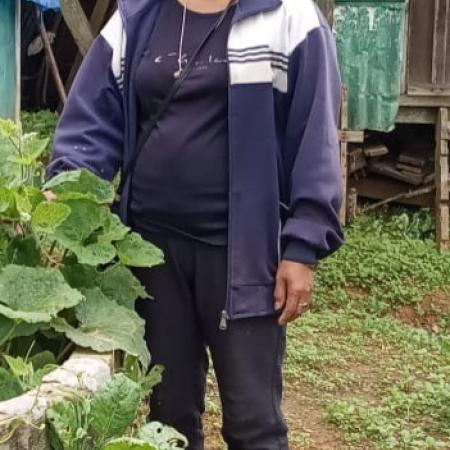
Ms. Lalbiakengi, age 40 years old hails from the village of Khawrihnim in Mizoram. She is a widow with two children.
Farming was Ms. Lalbiakengi's hobby. She did not look at it in any other way except as past time. However, with the sudden passing of her husband, she decided to attend this month-long training program about Home Gardening to provide for her family.
With the knowledge and confidence that she gained from the training program, she started using the new techniques to cultivate vegetables like okra, beans, mustard leaves, carrots, coriander. This training has aided her methods of farming as they have improved the quality and quantity of her produce.
It has also become a blessing to the residents of the village as they have benefitted from her new skills as well. The farmers of the village have come to her for help to learn about the new techniques of farming.
Her success story is not a smooth one. Despite having gained much more knowledge through the training, applying the new techniques were not easy for her due to the lack of financial support. Yet, she believes in hard work and persevering through the toughest of times.
